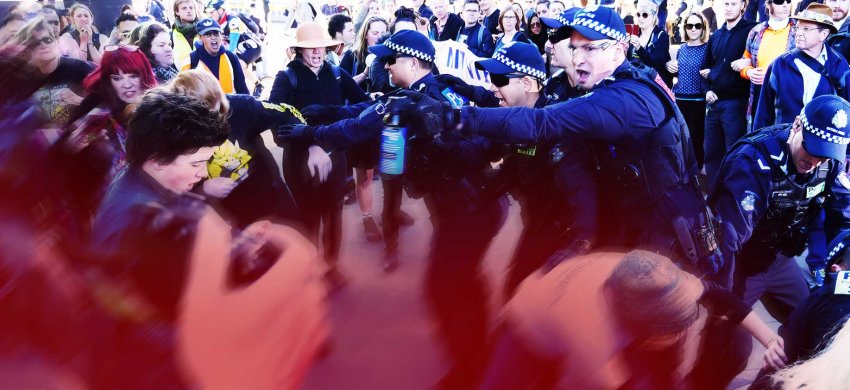
The Victorian Labor government, led by Premier Daniel Andrews, has declared Victoria to be the “most progressive state” in Australia.
Initiatives such as free degrees for nursing and midwifery students and the overhaul of early childhood education, including free kindergarten, are progressive social policy.
Labor has also stood up for abortion rights, safe injecting rooms and marriage equality.
However, it has also continued a form of neoliberal economic policy.
The 2021–22 budget, for instance, capped public sector wage rises at 1.5%, down from 2%, despite soaring inflation.
Teachers have protested, saying besides the lack of a real pay rise, work overload is another major problem. The Australian Education Union (AEU) has a 10-year staffing plan it wants the government to commit to greater funding.
“Right now, we risk a crisis in which kindergartens, schools and TAFEs cannot employ enough staff to meet even the most basic needs of students,” the AEU said.
The government has no plan to reach 100% of the school resourcing standard, considered the minimum standard for school funding.
‘Law and order’ failure
Labor has pushed its “law and order” policies, despite crime receding. It has expanded Victoria Police and the prison system, while imposing anti-protest laws on environment campaigners.
Integrity in politics is being seen as a key issue ahead of the November 26 election. The Age reported a “notable decline in public tolerance of misconduct by the state’s chief law enforcement agency”.
Despite Victoria Police failing to meet government-mandated integrity “performance measures” six years in a row, Victoria is one of the most heavily policed states in the country, spending more than $4 billion a year.
Funding for “law and order” outstrips that for education and health.
The Age reported last year that the state’s “war on crime” meant Victoria’s spending on the police, courts and prisons has grown at “double or triple the rate of other states and territories over the past decade”. Chris Vedelago and Royce Millar reported that Victoria is now arresting and jailing people at levels not experienced since the 19th century.
The huge funding boost was justified on the basis of improving community safety. But a government audit found that the $2 billion spent on 2700 additional police officers had done very little to improve safety.
The auditor general’s report was unable to determine how the police in 2016 concluded they needed 2729 additional officers to tackle crime.
Alongside this, the police force is being increasingly militarised, including being allowed to use non-lethal weapons against protesters.
Victoria Police is facing a class action for its unwarranted use of pepper spray against Blockade IMARC protesters in 2019.
The Andrews government has been criticised for its punitive approach to enforcing COVID-19 restrictions during the height of the pandemic: its harsh lockdown of public housing residents in Flemington was a case in point.
The Human Rights Law Centre criticised the Andrews government for some of the harshest bail laws in the world. They require the accused to demonstrate “compelling reasons” or “exceptional circumstances” to be released on bail.
Stemming carbon emissions
Keen to stem the greenslide as environmental consciousness rises, Labor announced it will close its three remaining coal-fired power plants years earlier than expected, generating the record carbon emissions cuts by 2035.
While welcome, the coal-fired plants closures have not been accompanied by a transition package for affected workers.
Labor also refused to rule out fossil-fuel-related projects such as the Viva Gas Terminal before the election.
Andrews’ plan to re-establish the State Electricity Commission is a step in the right direction. But the inadequate public-partnership model means that the government is too reliant on private capital to make the energy transition.
The After the Logging Report, commissioned by more than 19 environmental groups, criticised Labor for its unsustainable logging practices.
It found that 30% of coupes are failing to regenerate within three years, disputing Victoria Forests’ claims. Even logging coupes that have passed the test for successful regeneration are failing to grow into forests.
Forest campaigners who dare to protest are now facing huge fines and being thrown in jail under new anti-protest laws.
Despite committing to a treaty with the First Nations community, Labor was uninterested in protecting the sacred Djab Wurrung tree from being destroyed, despite the efforts of First Nations people and supporters.
Labor has been praised for investing in infrastructure, including removing unsafe level crossings. Yet it has done little to improve accessibility for people with disabilities. It has refused to duplicate the Upfield Line, alongside other infrastructure improvements, despite the ongoing efforts of public transport campaigners.
Neither has Labor bucked the neoliberal trend on privatising public assets.
It privatised the Melbourne Ports in 2014. Since 2017, Labor has pushed to privatise public housing under the guise of passing management of public housing to community housing providers.
This year it also partially privatised VicRoads to generate more than $7.9 billion in revenue. The Stop North East Link Alliance has been fighting the government’s push for greater car dependency and its serial neglect of public transport.
Labor has done very little to reverse the Jeff Kennett-era health and education privatisation spree, the consequences of which have led to an overloaded health system during the height of the COVID-19 pandemic and a crisis-ridden education system.
[Arie Huybregts is running for Socialist Alliance in Broadmeadows. Get in touch if you can help during pre-poll or on election day.]